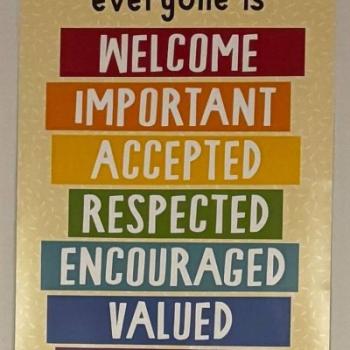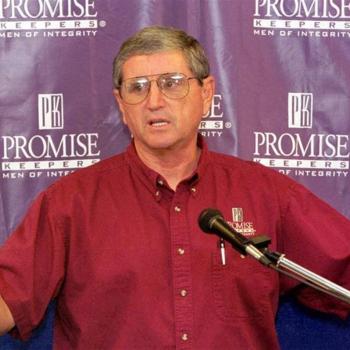When I worked at Washington National Cathedral, I occasionally had a friend comment on how daunting it must be to preach in front of presidents, senators, United States representatives, and Supreme Court justices. Truth be told, Cathedral canons preach to the last three, but mere canons are never invited to preach to Presidents. Having disabused friends of that impression, my reaction was always the same: "It's a little surreal at first, but if you really believe that you are preaching in front of Almighty God, the Lord of heaven and earth, it's all pretty much downhill from there."
I really did and do believe that. In fact, I am convinced that if we don't believe that and if Christians don't act like they believe it, then the church is lost and irrelevant. So, I am always deeply disturbed during the silly season of presidential campaigns (which is pretty much all year, every year now), because there is so little evidence that we really do believe that the circus which is the human practice of politics really is trumped by the reality that is our life in God.
The so-called Erastian notion that the church is subordinate to the state runs deeply in Protestantism. So deeply, in fact, that there is often no sense that there is a difference between Christian conviction and the "right" kind of politics. Only the notion of what constitutes the right kind of politics differs. The church's leadership jockeys for photo ops alongside the candidates. Christians gush when someone running for office takes a position that they believe corresponds closely with their own interpretation of the Gospel. We act as if the choice of a President has cosmic and apocalyptic significance for the future of the universe. We confuse political arguments for theological justifications and we blur the language of church and state in a way that renders the Christian contribution to our national life all but irrelevant.
Frankly, we don't look like people with a word from God. Instead, we look like desperate children screaming out an ingratiating, "Me too, me too, I think that too!"
The historical forces at play here are as old as American Protestantism, which was born hip to hip with the colonial foundations of our country. Most denominations have some kind of legislative body. In some cases we mimic the bicameral structure of our national legislature. We elect presiding officers, surround them with a bureaucratic mountain of allied agencies and departments. We are convinced that every problem has a legislative solution. We issue position papers. We are inclined to vote on everything, even in churches that don't have that kind of polity. And we try to achieve an advantage over those who disagree with us through the politics of leverage.
So I have no illusions about changing the way in which we think about and relate to national politics. It's hard to think theologically. We don't focus on it very well. We flinch at the thought that our spiritual commitments may put us at odds with pretty much everyone engaged in the debates, leaving us with positions and reasons for our positions that fit awkwardly, if at all, with those held by others. And, frankly, it is seductive (as all temptations are) to take a side.
But it has to said: When we let those forces sweep us forward, lost in the whirlwind that is presidential politicking, we run the risk of losing our collective and individual souls.
This isn't to say that we should not have opinions about civic affairs. Nor am I suggesting that we should stick our heads in the ground and ignore what happens and is said in presidential campaigns—or national affairs in general, for that matter. But we do have a God-given task that is ours as Christians, and if we don't give ourselves to that effort, no one will. Worse yet, we will witness—inadvertently, but clearly—not to the relevance of the Gospel, but to our failure to take it seriously.
So a few observations might be in order as we descend ever more deeply into that moneyed manipulation of national perceptions that we euphemistically describe as "the democratic process."
One, the choice of a president matters in the moment, but in the grand sweep of history, it matters very little. If history, viewed from the Christian point of view, tells us anything, we are not in control and history is littered, not just with leaders who have come and gone, but nations and empires that have vanished. We would do well to remember that we are dust and to dust we will return.
Two, the legitimacy of the church's position on any issue does not rise and fall with the endorsement of a president, never mind a presidential candidate. The church is obliged to be faithful to God. The moment the church becomes desperately dependent upon the positions taken by our leaders or our country, it has defaulted in that responsibility. I love my country, but my faith makes transcendent claims on my energy and loyalty.





